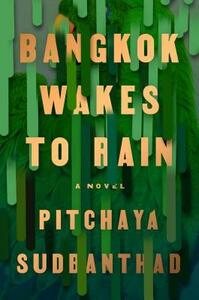You need to sign in or sign up before continuing.
Take a photo of a barcode or cover
This is a hard book to rate because I'm so conflicted. Overall, the book was good. And I wanted to like it, I really did. I should have liked it! The writing was beautiful, he had such a way with words that was probably one of the best I've read. The concept of time, memory, place, all those things intrigue me, and he captured the element of nostalgia perfectly. This novel made me feel somewhat sad throughout, in a way I can't put my finger on. And the technique of lots of little stories woven together throughout time, tied together by the place, Bangkok, I loved.
But the execution just didn't nail it on the head for me. Such a shame!
Honestly, throughout reading, I kept feeling irritated, as when a new chapter would start, I knew I would be thrown into a new time, with different characters, and it kept making me not want to pick the book up again once I'd put it down. I should have loved this element, but instead of feeling intrigued by the new stories, I'd just feel confused, making the story lose pace, the timeline feeling disjointed and clunky. We'd be thrown into someone's world without explanation, and I'd be struggling to pick up the cues as to who this character was and to what relation to a former character (whom I'd probably also forgot) and it just drove me to distraction. I realise now that I should have probably made notes as I was reading, but I was on a week's break and didn't feel like putting in that much effort!
That being said, I feel like this book would fare very well from a second read, with characters jumping out a bit more from the crowded timeline we're thrust into. To be honest, I think this book would jump up quite considerably in score upon a second reading, because there was elements to this book that I absolutely loved.
The concept of the human life, in all its intricacies, all but fade away into nothingness upon our deaths and the deaths of those who knew us. What a tragedy that we know this fate will befall most of us! This author, seeing this concept, plays with the idea of *SPOILER* a future world where we can record our memories and live them again, even replaying loved ones we've lost. A lot of reviews didn't like the future parts at the end of this book but I actually really liked it, and realise that it was essential. Some parts were a bit cringe, going into detail about how future people live just irks me for some reason when there's talk of new technology that seem so outlandish to me, even though probably likely, I just hate it. But the concept of uploading the self as data to live forever in your memories makes sense as the ending of this novel, where so many characters already live in the past. There's back and forth as to whether this is acceptable or not, so you see both sides, to live forever in your happiest moments is bliss for some, but torture for another knowing that it isn't real.
I have a theory, because it's briefly discussed, that places can hold memories. So I feel like the novel was from the point of view of Bangkok herself, and her memories of some of the citizens that lived in her, which would explain why the timeline jumps around so much. I don't know, but I kind of like that.
Anyway, a good book with a lovely concept that needs either a notepad and pen beside it, or just a good couple of reads!
But the execution just didn't nail it on the head for me. Such a shame!
Honestly, throughout reading, I kept feeling irritated, as when a new chapter would start, I knew I would be thrown into a new time, with different characters, and it kept making me not want to pick the book up again once I'd put it down. I should have loved this element, but instead of feeling intrigued by the new stories, I'd just feel confused, making the story lose pace, the timeline feeling disjointed and clunky. We'd be thrown into someone's world without explanation, and I'd be struggling to pick up the cues as to who this character was and to what relation to a former character (whom I'd probably also forgot) and it just drove me to distraction. I realise now that I should have probably made notes as I was reading, but I was on a week's break and didn't feel like putting in that much effort!
That being said, I feel like this book would fare very well from a second read, with characters jumping out a bit more from the crowded timeline we're thrust into. To be honest, I think this book would jump up quite considerably in score upon a second reading, because there was elements to this book that I absolutely loved.
The concept of the human life, in all its intricacies, all but fade away into nothingness upon our deaths and the deaths of those who knew us. What a tragedy that we know this fate will befall most of us! This author, seeing this concept, plays with the idea of *SPOILER* a future world where we can record our memories and live them again, even replaying loved ones we've lost. A lot of reviews didn't like the future parts at the end of this book but I actually really liked it, and realise that it was essential. Some parts were a bit cringe, going into detail about how future people live just irks me for some reason when there's talk of new technology that seem so outlandish to me, even though probably likely, I just hate it. But the concept of uploading the self as data to live forever in your memories makes sense as the ending of this novel, where so many characters already live in the past. There's back and forth as to whether this is acceptable or not, so you see both sides, to live forever in your happiest moments is bliss for some, but torture for another knowing that it isn't real.
I have a theory, because it's briefly discussed, that places can hold memories. So I feel like the novel was from the point of view of Bangkok herself, and her memories of some of the citizens that lived in her, which would explain why the timeline jumps around so much. I don't know, but I kind of like that.
Anyway, a good book with a lovely concept that needs either a notepad and pen beside it, or just a good couple of reads!
Sudbanthad's debut novel weaves storylines across space and time, linking back to the Thai capital and its cyclical rains and floods. A 19th-century missionary doctor treating cholera, an aging musician hired to play music for ghosts, two sisters in Thailand and Japan, a glimpse into the future of Bangkok underwater with people living in 'barge cities'. Sweeping scope, beautiful writing.
It's an easy comparison to David Mitchell's Cloud Atlas, but there were some other intriguing elements here that made this one unique - interludes narrated by birds, 1970s political landscape, and the floods that link back to impermanence and the fluidity of time, memory, and place.
It took me a few pages to warm up to this one, and I was glad I stuck around. Very rewarding, and I look forward to seeing what Sudbanthad does next.
It's an easy comparison to David Mitchell's Cloud Atlas, but there were some other intriguing elements here that made this one unique - interludes narrated by birds, 1970s political landscape, and the floods that link back to impermanence and the fluidity of time, memory, and place.
It took me a few pages to warm up to this one, and I was glad I stuck around. Very rewarding, and I look forward to seeing what Sudbanthad does next.
his is one of the most unusual books I have ever read. Part history, part contemporary climate issues, part science fiction, the book bends the genre. It is a book of short stories that include characters at different times in their lives who interact with different characters. We meet Sammy, Thai and British, who wanders the world trying living off his inheritance and trying to make money with his photography until he just stops bothering. Nee and Nok are sisters. Nok moved to Japan with her husband and opened a Thai restaurant.
Nee stayed behind and was involved in the student demonstrations of the 1970's. A young man with whom she had fallen in love is killed in the demonstrations. Meanwhile, a few years later the "Colonel" who was responsible for the deaths of the students is in exile in Japan and discovers Nok's restaurant. Woven in and out is Clyde, a black, gay jazz pianist who left his lover behind in the 70's. When he has the opportunity to make enough money to go back to New York, he stays. He never sees his lover again.
The first character is Phineas a missionary doctor who has come to "Siam" to help the people medically and also to convert them to Christianity. They are happy to come to him for medical help but not for religious instruction. He finds them to be "arrogant." Interesting choice of words, isn't it?
Underlying all of this is the water - it's everywhere. It spills over the streets periodically. Everyone is accustomed to it. As the 20th century progresses, though, it's getting worse. Toward the end of the book, the water has submerged the former capital of Bangkok. The historic sites are under water. Tours are available for tourists who are willing to brave the dirty water and see what is gone.
However, the book's central theme is a beautiful old house started by a trader. It's the house in which Sammy grew up. His parents are divorced & his father allowed his wife to have the house. His father is living in England now with a new wife, Helen. Sammy's mother wanders around the house alone. The parties and friends are done, Sammy is grown up. When she dies, Sammy sells it and it is torn down except for the facade and is turned into condos. The condos are woven in and out of the stories.
Nee, now an adult, manages the condo complex after starting as a cleaning woman. Nee and Nok haven't spoken in years. Nee was a swimmer in school and now teaches swimming to kids who live in the condos. Nee meets Sammy, they have an affair. Then he is faced with a decision.
We meet one of her students years later as a middle aged then elderly woman. The first story is of an unnamed girl who hears a noise and tries to protect herself from an unknown threat.
Towards the end, it is now 2020's Bangkok. Mai and her friend, Pig, are now elderly women. Mai has allowed herself to become transcendent. Elderly people with means can stay alive longer. It's never fully explained, but I picture Captain Pike in the first Star Trek story: his body is gone, but he is kept alive by some extraterrestrials by use of a machine. You only see his head. When I first saw that, I thought of iron lungs. The people who take advantage of this technology go to a beach in Cornwall or can resurrect their memories and go back in time. It's not guaranteed because there will be other people's memories mixed in.
The 19th century missionary and the pianist are examples of westerners sucked in by the culture of Thailand. This is such an interesting book. It has it's low points, but for the most part the writing is excellent. It should be interesting to see what he writes next.
Just a suggestion: I included the quote from the Washington Post because it's an excellent review. There is also a very different and also excellent one on NPR.org. Check out reviews before you read. It will make a difference.
Nee stayed behind and was involved in the student demonstrations of the 1970's. A young man with whom she had fallen in love is killed in the demonstrations. Meanwhile, a few years later the "Colonel" who was responsible for the deaths of the students is in exile in Japan and discovers Nok's restaurant. Woven in and out is Clyde, a black, gay jazz pianist who left his lover behind in the 70's. When he has the opportunity to make enough money to go back to New York, he stays. He never sees his lover again.
The first character is Phineas a missionary doctor who has come to "Siam" to help the people medically and also to convert them to Christianity. They are happy to come to him for medical help but not for religious instruction. He finds them to be "arrogant." Interesting choice of words, isn't it?
Underlying all of this is the water - it's everywhere. It spills over the streets periodically. Everyone is accustomed to it. As the 20th century progresses, though, it's getting worse. Toward the end of the book, the water has submerged the former capital of Bangkok. The historic sites are under water. Tours are available for tourists who are willing to brave the dirty water and see what is gone.
However, the book's central theme is a beautiful old house started by a trader. It's the house in which Sammy grew up. His parents are divorced & his father allowed his wife to have the house. His father is living in England now with a new wife, Helen. Sammy's mother wanders around the house alone. The parties and friends are done, Sammy is grown up. When she dies, Sammy sells it and it is torn down except for the facade and is turned into condos. The condos are woven in and out of the stories.
Nee, now an adult, manages the condo complex after starting as a cleaning woman. Nee and Nok haven't spoken in years. Nee was a swimmer in school and now teaches swimming to kids who live in the condos. Nee meets Sammy, they have an affair. Then he is faced with a decision.
We meet one of her students years later as a middle aged then elderly woman. The first story is of an unnamed girl who hears a noise and tries to protect herself from an unknown threat.
Towards the end, it is now 2020's Bangkok. Mai and her friend, Pig, are now elderly women. Mai has allowed herself to become transcendent. Elderly people with means can stay alive longer. It's never fully explained, but I picture Captain Pike in the first Star Trek story: his body is gone, but he is kept alive by some extraterrestrials by use of a machine. You only see his head. When I first saw that, I thought of iron lungs. The people who take advantage of this technology go to a beach in Cornwall or can resurrect their memories and go back in time. It's not guaranteed because there will be other people's memories mixed in.
The 19th century missionary and the pianist are examples of westerners sucked in by the culture of Thailand. This is such an interesting book. It has it's low points, but for the most part the writing is excellent. It should be interesting to see what he writes next.
Just a suggestion: I included the quote from the Washington Post because it's an excellent review. There is also a very different and also excellent one on NPR.org. Check out reviews before you read. It will make a difference.
Evocative, entrancing, surprising. It took a little while to get into this, but I’m glad I stuck with it. As the connections became clear between the characters, a beautiful and complex slice of Thai life, culture and history (and future!?!) was revealed. Super cool book.
It took me a bit to get into this—at first it read like a series of seemingly disjointed (but engaging!) threads. Once I realized how these threads tied together, I tore through this book. If you love stories about place, keep an open mind on format at stick with this one! By the end, I was convinced that the unconventional format enhanced the whole experience.
reflective
medium-paced
Plot or Character Driven:
N/A
Strong character development:
No
Loveable characters:
No
Diverse cast of characters:
Yes
Flaws of characters a main focus:
No
emotional
reflective
sad
tense
slow-paced
Plot or Character Driven:
Character
Strong character development:
Yes
Loveable characters:
Complicated
Diverse cast of characters:
Yes
Flaws of characters a main focus:
Yes
challenging
emotional
reflective
medium-paced
I read the first couple parts of this bookin one sitting because it gripped and fascinated me immensely but then the part where it gets futuristic/dystopian felt pointless to me and it unfortunately took some of the magic away but nevertheless this is probably my favorite read this year so far
dark
emotional
reflective
slow-paced
Plot or Character Driven:
Character
Strong character development:
Yes
Loveable characters:
No
Diverse cast of characters:
Yes
Flaws of characters a main focus:
Yes
This was beautifully written, and it reflected a wet, saturated, slow mood. I couldn't always stay interested in the stories, and I agree with some others that telling the stories in chronological order wouldn't have hurt the narrative, instead helped it. I think the story I enjoyed most was New Krungthep.





